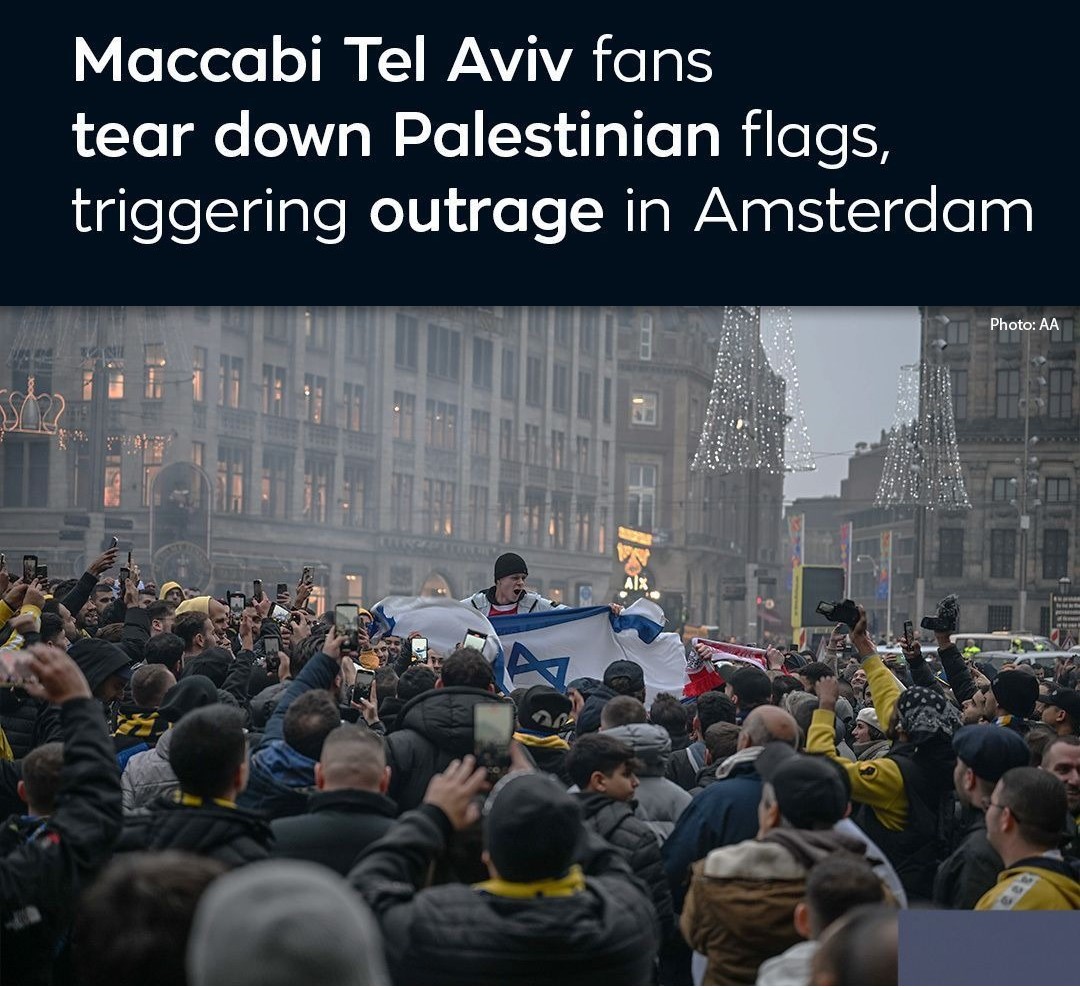Confrontations this week involving fans of the Maccabi Tel Aviv soccer club in Amsterdam have sparked widespread outrage and opened a broader conversation about the role of media representation, global political responses, and the influence of the Israeli-Palestinian conflict beyond the Middle East.
What began as a tense soccer match escalated into violent altercations across the city, drawing sharp reactions from political leaders, community members, and critics of the international media.
The incident reportedly started during a moment of silence held at the stadium in Amsterdam for the victims of Spain’s recent devastating floods. Witnesses claim some Maccabi Tel Aviv fans disrupted the observance by chanting inflammatory, anti-Palestinian slogans.
“They shouted things like ‘Death to Arabs’ and ‘Let the IDF f*ck the Arabs,’” recalled one Dutch resident who attended the match. “It felt like they were purposefully provoking anyone who might stand against them.”
The provocative behavior allegedly continued outside the stadium, where Maccabi fans were seen tearing down Palestinian flags and engaging in hostile exchanges with locals, sparking a series of altercations that escalated into violence.
According to witnesses, the fans chanted genocidal slogans, which many interpreted as hate speech in violation of the 1948 Genocide Convention, to which both the Netherlands and Israel are signatories. A resident in Amsterdam commented,
“They were tearing down Palestinian flags in the streets and chanting things that would be criminalized in most countries. That’s when the local residents started to confront them.”
The incident quickly caught the attention of political leaders across Europe, many of whom denounced the violence, though some statements leaned heavily on condemning anti-Semitic aggression.
Ursula von der Leyen, President of the European Commission, stated, “I am appalled by these vile attacks targeting Israeli citizens in Amsterdam. Anti-Semitism has absolutely no place in Europe, and we must stand firm against any form of hatred.” Dutch Prime Minister Mark Rutte similarly called for “mutual respect and restraint to defuse this volatile situation.”
However, critics argue that these statements, and much of the media coverage, focused primarily on the violence directed at Israeli fans while downplaying or ignoring the provocative actions that allegedly led to the conflict.
A Dutch photographer who captured footage of the confrontations commented, “My video is being circulated with claims that Maccabi fans were attacked. In reality, this was footage of them initiating violence against a Dutch man, and the context has been completely twisted.”
Former Israeli Prime Minister Naftali Bennett also weighed in, describing the events as a “pogrom in action” and calling on Dutch authorities to intervene to protect Jewish citizens.
However, some, like Israeli analyst Ma’ar Zein, criticized this framing, arguing that it mischaracterizes the situation and trivializes genuine instances of anti-Semitic violence. “Comparing these actions to historic pogroms or the Holocaust is offensive,” Zein stated. “It trivializes Jewish suffering and weaponizes anti-Semitism in a way that is reckless and harmful.”
Further complexity is added to the incident given the likelihood that many of the young Maccabi Tel Aviv fans involved are currently serving members of the Israel Defense Forces (IDF), due to Israel’s mandatory military service. As of 2024, both the International Criminal Court (ICC) and the International Court of Justice (ICJ) have ongoing investigations into alleged war crimes committed in Gaza.
Some of these investigations focus on recent Israeli military operations, which may involve IDF soldiers who could have participated in the Amsterdam incident. A resident remarked, “Knowing that some of these young men may have been involved in alleged war crimes makes this situation even more disturbing. This isn’t just about soccer; it’s a global issue.”
Amid these accusations, left-wing Israeli politician Ofer Cassif spoke out, condemning the behavior of Maccabi fans and calling for a balanced accountability. Cassif remarked, “What we’re seeing is the spirit of Israeli fascism spilling into Europe. Fans are tearing up Palestinian flags, shouting slogans as if they are an occupying force, and then acting surprised when violence comes back their way. Violence from any side is wrong, but accountability has to be a two-way street.”
These events occur against the backdrop of ongoing violence in Gaza, where, as of November 9, 2024, reports indicate that the Palestinian death toll from Israeli attacks has surpassed 43,000, with thousands more injured. This escalation has intensified global scrutiny and fueled debates over the broader Israeli-Palestinian conflict, especially given the human toll on Gaza’s civilian population.
Media coverage of the incident has been a particular flashpoint. Many accuse the Western media of distorting the sequence of events, focusing solely on portraying the Israeli fans as victims without addressing their role in provoking hostilities. One Amsterdam resident said, “If Russian fans had chanted through a moment of silence for victims in a country opposed to Russia, while calling for the murder of Ukrainian children, the outrage would be deafening. Yet here we see a clear double standard.”
The BBC issued a disclaimer after reporting on the incident, including an account from a fan who claimed that Maccabi fans were moving through Amsterdam’s metro cars “looking for a fight.” This fan noted, “They were going up and down the carriages, actively looking for anyone who might challenge them. Everyone knew what was going to happen, and I’m shocked that the media painted it so differently.”
Amsterdam’s mayor later condemned the anti-Semitic attacks on Israeli fans, while noting that both sides bore responsibility for the unrest that unfolded.
The Amsterdam incident has amplified calls for transparency, accuracy, and sensitivity in media coverage, particularly when addressing sensitive international issues. As tensions continue to rise, there is a growing demand for balanced and nuanced reporting that captures the complexity of the Israeli-Palestinian conflict and refrains from exacerbating divides with biased narratives.
With the violence in Gaza mounting and European cities like Amsterdam becoming unexpected flashpoints for this deeply polarized issue, the incident serves as a stark reminder of the need for fair and truthful media representation in a world where regional conflicts have global repercussions.




